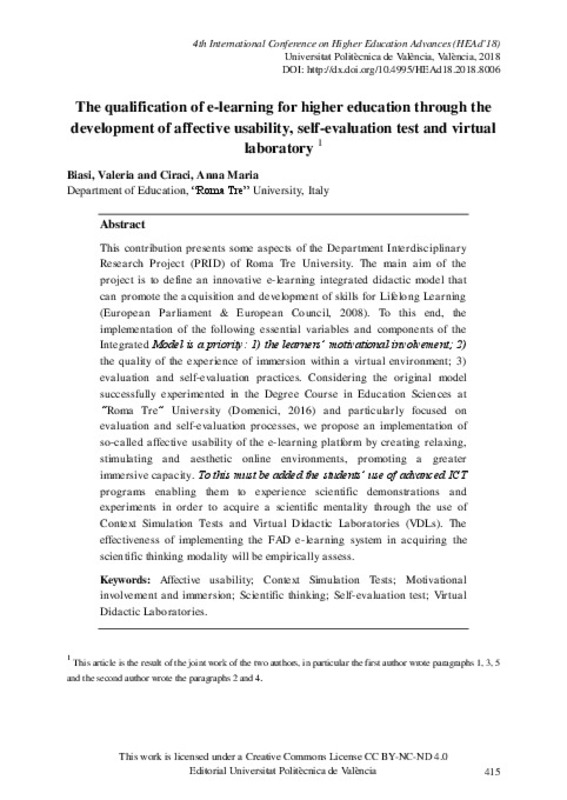JavaScript is disabled for your browser. Some features of this site may not work without it.
Buscar en RiuNet
Listar
Mi cuenta
Estadísticas
Ayuda RiuNet
Admin. UPV
The qualification of e-learning for higher education through the development of affective usability, self-evaluation test and virtual laboratory
Mostrar el registro sencillo del ítem
Ficheros en el ítem
| dc.contributor.author | Biasi, Valeria
|
es_ES |
| dc.contributor.author | Ciraci, Anna
|
es_ES |
| dc.date.accessioned | 2018-10-05T13:15:20Z | |
| dc.date.available | 2018-10-05T13:15:20Z | |
| dc.date.issued | 2018-07-02T13:15:20Z | |
| dc.identifier.isbn | 9788490486900 | es_ES |
| dc.identifier.issn | 2603-5871 | |
| dc.identifier.uri | http://hdl.handle.net/10251/109676 | |
| dc.description.abstract | [EN] This contribution presents some aspects of the Department Interdisciplinary Research Project (PRID) of Roma Tre University. The main aim of the project is to define an innovative e-learning integrated didactic model that can promote the acquisition and development of skills for Lifelong Learning (European Parliament & European Council, 2008). To this end, the implementation of the following essential variables and components of the Integrated Model is a priority: 1) the learners’ motivational involvement; 2) the quality of the experience of immersion within a virtual environment; 3) evaluation and self-evaluation practices. Considering the original model successfully experimented in the Degree Course in Education Sciences at “Roma Tre” University (Domenici, 2016) and particularly focused on evaluation and self-evaluation processes, we propose an implementation of so-called affective usability of the e-learning platform by creating relaxing, stimulating and aesthetic online environments, promoting a greater immersive capacity. To this must be added the students’ use of advanced ICT programs enabling them to experience scientific demonstrations and experiments in order to acquire a scientific mentality through the use of Context Simulation Tests and Virtual Didactic Laboratories (VDLs). The effectiveness of implementing the FAD e-learning system in acquiring the scientific thinking modality will be empirically assess. | es_ES |
| dc.description.uri | http://ocs.editorial.upv.es/index.php/HEAD/HEAD18 | es_ES |
| dc.format.extent | 9 | |
| dc.language | Inglés | es_ES |
| dc.publisher | Editorial Universitat Politècnica de València | es_ES |
| dc.relation.ispartof | 4th International Conference on Higher Education Advances (HEAD'18) | |
| dc.rights | Reconocimiento - No comercial - Sin obra derivada (by-nc-nd) | es_ES |
| dc.subject | Higher Education | es_ES |
| dc.subject | Learning | es_ES |
| dc.subject | Educational systems | es_ES |
| dc.subject | Teaching | es_ES |
| dc.subject | Affective usability | |
| dc.subject | Context simulation tests | |
| dc.subject | Motivational involvement and immersion | |
| dc.subject | Scientific thinking | |
| dc.subject | Self-evaluation test | |
| dc.title | The qualification of e-learning for higher education through the development of affective usability, self-evaluation test and virtual laboratory | es_ES |
| dc.type | Comunicación en congreso | es_ES |
| dc.type | Capítulo de libro | es_ES |
| dc.identifier.doi | 10.4995/HEAD18.2018.8006 | es_ES |
| dc.rights.accessRights | Abierto | es_ES |
| dc.description.bibliographicCitation | Biasi, V.; Ciraci, A. (2018). The qualification of e-learning for higher education through the development of affective usability, self-evaluation test and virtual laboratory. Editorial Universitat Politècnica de València. 415-423. https://doi.org/10.4995/HEAD18.2018.8006 | es_ES |
| dc.description.accrualMethod | OCS | es_ES |
| dc.relation.conferencename | Fourth International Conference on Higher Education Advances | es_ES |
| dc.relation.conferencedate | Junio 20-22,2018 | es_ES |
| dc.relation.conferenceplace | Valencia, Spain | es_ES |
| dc.relation.publisherversion | http://ocs.editorial.upv.es/index.php/HEAD/HEAD18/paper/view/8006 | es_ES |
| dc.description.upvformatpinicio | 415 | |
| dc.description.upvformatpfin | 423 | |
| dc.type.version | info:eu-repo/semantics/publishedVersion | es_ES |
| dc.relation.pasarela | OCS\8006 | es_ES |








